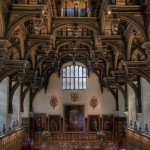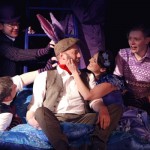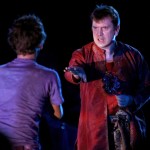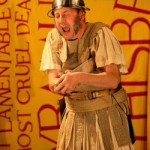It seems odd to be writing a review of a play my colleagues and I are presently rehearsing, especially when as productions they are chalk and cheese. But then the beauty of the bard is that Shakespearean plays can be interpreted in a thousand ways, and then some, and all be equally right. What differentiates them is the quality and attention to detail, in which regard many are to be found lacking in one way or another.
Antic Disposition’s take on The Dream got off to a flying start by the selection of Middle Temple Hall as the venue, where on 2 February 1602 Twelfth Night was first performed. The character and ambience of the hall are without parallel, though the high and ornate ceiling did not help the acoustics. Neither did the long thin stage area, with seats placed down the long sides of the hall: when the action was at the other end, some way distant, it was hard to see what was happening, let alone hear. You felt for poor Theseus and Hippolyta, who were also some way distant from the action in Pyramus & Thisbe!
That said, this was a production of boundless energy, making full use of the space and making the actors work doubly hard to fill it, and fill it they certainly did. Shakespeare’s dialogue has been heavily sliced to fit the play into 2hrs 1om, including a 20-minute interval. Curiously, many of the cuts are different to those made by our esteemed director, Michael Lewis, though even more savage in many areas. The effect is to keep the pace high and the audience awake, always good practice with Shakespeare, even for a his lightest and fluffiest comedy.
Production design was kept to a minimum, the set restricted to a few step ladders, a dressing box (from which Puck nimbly springs), and a few other odds, sods and props (deliciously purple “love in idleness” flowers spring to mind.) This style befits the play well and helps to keep it light on its toes.
There are no obvious weak links in casting, though ironically the characters I found least effective were Theseus and Oberon, the roles I am shortly to play. I may be biased but Tony Austin’s performance in both roles seemed marginally underplayed, dull and worthy rather than hitting the top notes. As Theseus announces the three marriages and the great feast, he could almost have been hailing a cab rather than rejoicing. Admittedly the temptation to go overboard with Oberon’s jealous rages is a risk, but Austin appears to have erred on the side of caution and for quoting verse stoically rather than acting the emotion in many of his lines. Helen Evans as a feisty Hippolyta and Titania seems more than a match for him on occasions.
Dylan Kennedy’s Irish Puck more than lived up to his billing as the “mad spirit” in comic invention and slapstick timing, though somehow fell slightly short of Puck’s darker side. He formed an effective double-act with Oberon, often the mainstay of the magical side to the play. His magic is worn lightly but effective.
I liked Nicholas White’s Bottom from before the show began, since he and the other mechanicals were talking to the audience and offering Maltesers, but he won further favour with me for the programme comment that “his ambition is to be cast in a ‘thin’ role.” He is slimmer than Chris David Storer’s Snug, to be sure, but his Bottom (as opposed to his bottom) is three-dimensional and more than simply a comic device, though it was a slight pity his ass was no more than a pair of ears and false teeth. He was ably backed by the band of youngish mechanicals, including Christopher Rowland, who as Flute made such an able bewigged Thisbe I can see him in demand as a pantomime dame for many a long year.
The lovers are etched in contrasting modes: bookish Helena in her glasses (Joanna Nuttall); a wilful, embittered and sometimes enraged Hermia (Ami Sayers); an eager Lysander (Edward Lewis French, who reminded me of James McAvoy); and besuited but not bewildered Demetrius (Robert Welling). Each had their moments, especially in the wonderful scene where each is in turn at the other’s throat while rivalling for love, under the mistaken influence of Oberon’s aphrodisiac love potion. Hermia is (correctly) shorter than Helena, but I did feel sorry for her being described by Lysander as “you dwarf, you minimum of knot grass made, you bead, you acorn.” She is not THAT short!
Of the other roles, I liked Chris Courtenay’s enraged father Egeus, though he seemed young to be Hermia’s father and also a tad too accepting of Theseus trampling his tattered ego. The director could have made more of the Greek law whereby a father may have his daughter put to death if she did not accede to his wishes, but sadly many of those lines were cut.
The costume department had something of an erratic time along the way. Some outfits worked well, notably Puck in purple tasselled pants and a matching sequinned t-shirt. Oberon’s fiery red ensemble included similar trousers, a vivid contrast to Titania’s ice maiden in blue and white. The mechanicals seemed well suited in tweeds and waistcoats, and indeed the same actors as fairies in slightly more colourful versions of the same costume, with knee-length socks and britches. Peter Quince more resembled a warehouseman or shop-keeper than carpenter, though that is a trifle picky. Bottom’s Pyramus outfit is, however, a sight to behold, including both red polka-dot spotted silk boxer shorts and a colander topped with a scrubbing brush as headpiece.
The lovers, by contrast, seemed at various times to have random garments hurled on, as if they had been awakened from their respective sleeps and grabbed the first clothes to hand. Helena was attired for a long while in a long and elegant black gown paired with Converse basketball boots. From the front her footwear could be forgiven, but from rear view, with her bra fully on display, it looked like a seriously bad dress day. As for the very attractive Hermia in a tiny summer dress that barely covered her essentials, and failed to do so on occasions. Her clothing caused an unnecessary distraction – certainly to the male segment of the audience.
A word also for the music. Ethereal Shakespearean is the term that springs to mind, appropriate but other-worldly. The Fairy song is paired with a catchier melody than our version, but retains a hint of darkness about it. I did like the folky music employed at the end, and of the clever ploy of getting the audience to clap in time to the music, but then at greater pace to applaud the bows. The choreographer must have had a field day with this production!!
Niggles notwithstanding, Ben Horslen has created a lively and entertaining Dream, culminating in the play within the play, occupying most of Act 5 – from which he has wrung most of the comic potential. All deserve credit for a fine production. I hope ours is at least half as good!





Cant wait to see the production your in..